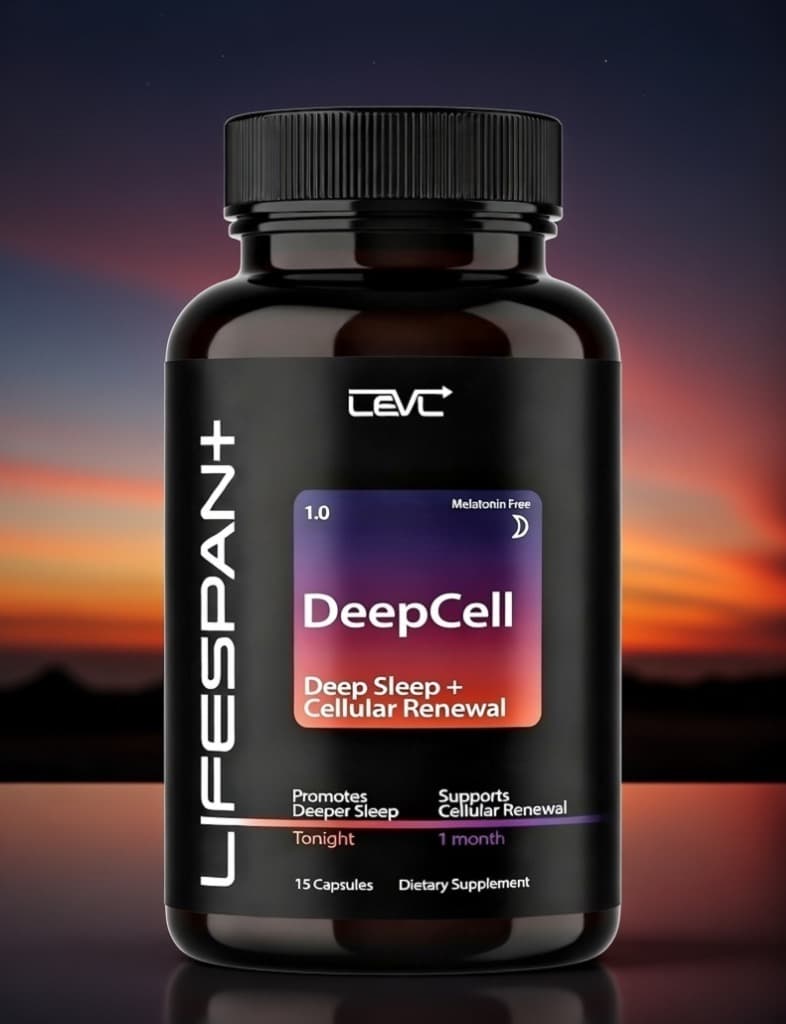OutPace Aging
in Your Sleep
A melatonin-free sleep and cellular renewal stack for people who want better nights and more tomorrows.
- Deeper, more restorative sleep
- Designed to support autophagy and nighttime cellular cleanup
- 13 active ingredients shown to improve 8 hallmarks of aging
Better Nights. More Tomorrows.
PhD Formulated • Physician Approved • Science Led Longevity

Timeline of Benefits
What to expect when you OutPace Aging
Tonight
- • Fall asleep faster and feel calmer
- • Wake with a clear head instead of a melatonin hangover
1 Week
- • More consistent sleep schedule
- • Deeper, more restorative sleep
1 Month
- • Support for autophagy & mitochondrial function
- • Improved recovery from training and long days
Long Term
- • Supports Healthy Brain Aging
- • Supports Cellular Rejuvenation
Built with real world feedback
We test until the data says it works.
"LEVL’s DeepCell product has worked tremendously for me. I typically have a hard time falling asleep, often lying awake for hours, but since I started using this, I’ve noticed a huge difference. Within an hour of taking the supplement, I feel relaxed and a sleepy wave comes over me. I’m able to drift off without the usual tossing and turning. What I love most is that I wake up feeling refreshed and energized, never groggy or drowsy. It’s been a total game changer for my nightly routine."
DeepCell Testing App
Do not just trust claims.
See your own data.
- Connect Oura, Apple Watch, or Whoop
- Track sleep stages, HRV & energy
- Run A/B experiments on your routine
Gain Early Access
Join the first cohort to test DeepCell. Founding customers get launch pricing and direct input into future formulations designed to extend healthy lifespan.
Targeting 8 Key Hallmarks of Aging
DeepCell isn't just a sleep aid. It's a longevity protocol.
Improved Hallmarks of Aging
Vitamin B6
5 mgCofactor for neurotransmitter and melatonin synthesis that helps convert L tryptophan into serotonin and sleep supporting signaling.
Magnesium Glycinate
70 mgHighly absorbable magnesium chelate that supports nervous system calm, muscle relaxation, and over 300 metabolic reactions.
Zinc (as Zinc Citrate)
8 mgEssential mineral involved in antioxidant defenses and enzymes that maintain DNA integrity and hormone balance.
Valerian Root Extract
300 mgTraditional calming root that modulates GABA signaling to reduce sleep onset time without heavy sedation.
Astragalus Root Extract
300 mgAdaptogenic root used to support immune resilience and telomere maintenance in preclinical research.
Lemon Balm Extract
250 mgMember of the mint family that reduces restlessness and supports sleep quality while providing gentle antioxidant support.
L Theanine
200 mgAmino acid from green tea that promotes relaxed alertness by increasing alpha brain waves and balancing excitatory signaling.
L Tryptophan
100 mgEssential amino acid and precursor for serotonin and melatonin pathways, included at a gentle dose.
Passion Flower Extract
100 mgFlowering vine used for easing a racing mind and improving subjective sleep quality.
Hops Extract
100 mgBitter cone that works with valerian and supports deeper sleep architecture.
Apigenin
50 mgChamomile derived flavonoid that interacts with GABA receptors and is studied for sleep and autophagy.
Luteolin
50 mgPolyphenol with antioxidant and microglial calming properties that helps maintain healthy inflammatory responses.
Lithium Orotate
50 mgTrace dose lithium salt explored for neuroprotective and mood supporting effects in early research.
The Science of Sleep Meets the Biology of Aging
Peak Health Today,
Longevity Escape Velocity Tomorrow
Longevity Escape Velocity is the point where every year you stay alive, science adds more than a year of healthy life expectancy back. LEVL exists to help people reach that point.
Advanced formulations that target multiple hallmarks of aging.
An outcomes testing app that closes the loop between science and protocol.
A community of people who want to live long enough to live forever.

